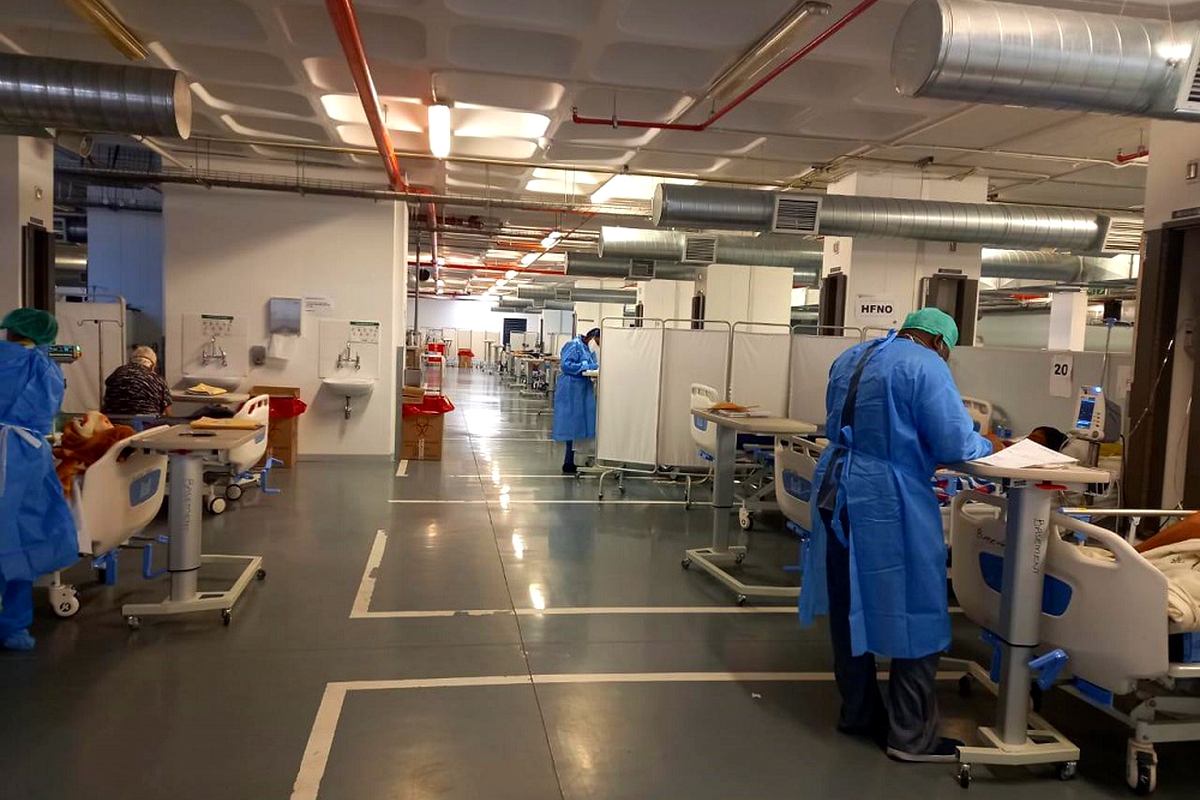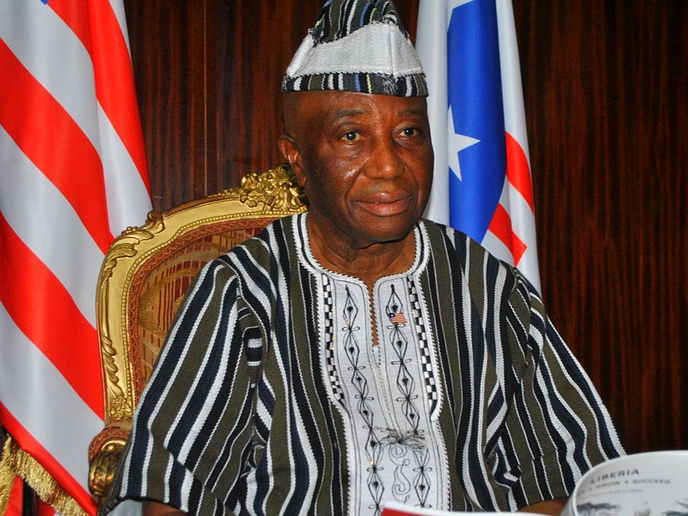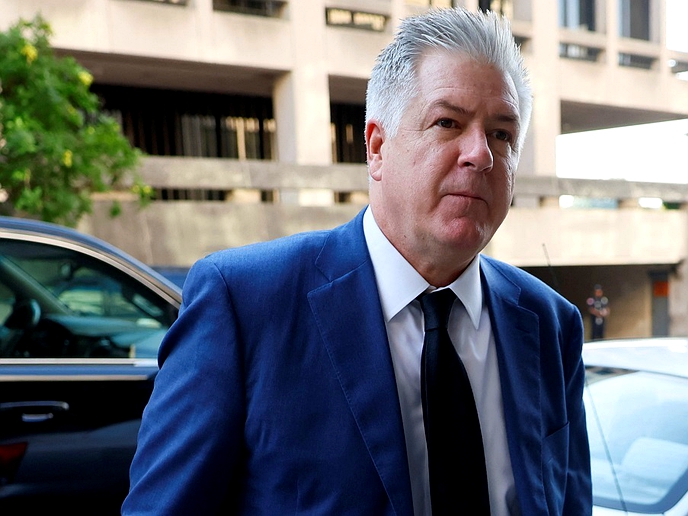GQEBERHA – INSTEAD of surgery, orthopedic patients at Livingstone Hospital in Gqeberha, Eastern Cape, are being given a letter explaining that they cannot be helped because there are no metal implants available. The letter includes the number of the Presidential Hotline for patients to call.
africa
March 27, 2023
DAILY MAVERICK
6 min read
Livingstone Hospital doctors say they can’t fix broken bones

Inside the Livingstone Hospital in Gqeberha, Eastern Cape
Story highlights
Dear Patient,
You have been admitted to Livingstone Hospital because you require emergency/urgent treatment for an orthopaedic condition.
Unfortunately, the implants (metal devices used to fix broken/deformed bones) needed to best treat you are not currently available in the hospital. Depending on your injury and the delay the implant unavailability causes, you might not be able to be treated surgically and have a poor result/outcome. Your doctors have not been informed when implants will again be available nor given any alternative hospitals to transfer you to.
This is the text of a letter that is being given to orthopaedic patients who cannot be helped at Livingstone Hospital, one of three tertiary hospitals in the Eastern Cape and one of the largest and busiest casualty units in the province.
The hospital is estimated to serve about 2.5 million people, many of whom live in surrounding rural areas.
The letter lists three telephone numbers: one for the hospital’s complaint service, the other for the Eastern Cape Department of Health’s complaint line, and the third for the Presidential Hotline.
Desperate patients with broken arms and legs are begging for help, but the doctors say there is nothing they can do.
“The sad truth is that most of our patients think it is acceptable for them to wait,” a hospital source said. Patients also worry that complaining will jeopardise their chances to get surgery.
“Resources do not exist to treat trauma emergencies to a medico-legal standard,” clinicians warned in a letter written to the department’s managers in 2021. Yet the crisis continues.
In a written answer to the Eastern Cape Legislature a month ago, Dr Rolene Wagner, the head of the Eastern Cape Department of Health, said the department was providing patients whose jobs depended on successful surgeries with sick notes and additional medical reports.
“Additional support is provided by referral to the social worker and where applicable a referral for a temporary social grant is also facilitated.”
She said the procurement of implants and medical and surgical supplies, “supported by the approval of the relevant tenders and amended supply chain management regulations”, was underway. The hospital was also working with district hospitals to see which surgeries could be done there, she said.
The department, however, was unable to provide a timeframe for when the surgery backlog would be addressed. It indicated that it would “try its best” to do so in the 2023/2024 financial year.
“Patients are not referred to other facilities, whether in or outside of the province, specifically for the backlog from Livingstone. Referrals would usually, on principle, be done for specialist care at the central hospitals or for specialist interventions not done in the facility.”
Livingstone Hospital last had a permanent CEO in 2018 when a violent protest by four unions organised by Nehawu forced then-CEO Thulane Madonsela and his management team out of the hospital.
Madonsela eventually resigned after being suspended by the former head of the department, Dr Thobile Mbengashe.
Madonsela and his management team were recently paid millions after the labour court ordered that they each be compensated with six months’ salaries and legal costs. The court confirmed an arbitration ruling that their suspension had been wrong.
In December 2022, Dr Mtandeki Xamlashe, the hospital’s then-acting CEO, admitted to the health portfolio committee doing oversight at Livingstone Hospital that there was a shortage of orthopaedic implants and more than 100 trauma patients were on the waiting list. Xamlashe has since been promoted to top management in the provincial department.
In a report adopted by the Health Portfolio Committee in February, MPs wrote:
“The Acting CEO presented to the Committee and highlighted that the facility had been affected by Covid-19 and that there was a governance collapse. He further indicated that staff morale has been negatively affected by Covid-19. The Acting CEO noted that they had not received any support post-Covid-19. He indicated that the hospital faces severe staff shortages and that maintenance is very poor.”
The hospital currently has 400 unfunded beds.
In June last year, the Eastern Cape Legislature passed a unanimous motion, brought by the Democratic Alliance’s Jane Cowley, that the suppliers of orthopaedic implants to state hospitals in the province must be paid. Yet payment did not happen.
The shortage of orthopaedic implants was again raised in a letter written by a number of senior doctors in the metro. Health MEC Nomakhosazana Meth blamed COVID-19 and possible duplication of invoices.
In August 2022, the department admitted that it owed the suppliers of orthopaedic implants R52-million.
Meth highlighted in her answer to the Eastern Cape Legislature that there had been “unprecedented demand” for trauma and mental health services in the Nelson Mandela Bay metro, which she said was also due to the increased population of the city.
Meth indicated that the invoices would be paid by August 2022. This did not happen and, in November, replying to oral questions in the Legislature, Meth again said suppliers would be paid.
Delivering his budget speech this month, Mlungisi Mvoko, the Eastern Cape MEC for Finance, said medico-legal claims were still draining provincial coffers, leaving the department with serious cash flow challenges.
Enjoy our daily newsletter from today
Access exclusive newsletters, along with previews of new media releases.
He said a strategy to address this was being implemented: “The multi-pronged strategy’s main purpose is to steer provincial health services into becoming more comprehensive and balanced in responding to an individual patient, family, and community health needs.”
Mvoko said there had been a 96% reduction in in-year irregular expenditure to less than R3.4-million in 2022/23 from R104-million in 2021/22 due to improvements in systems and controls.
“The provincial health department has reprioritised its budget and made available R544-million over the [medium term] towards maintenance and acquiring much-needed health machinery and equipment,” he said.
Cowley, the DA’s spokesperson on the metro, said the operational budgets of all hospitals in the province were dramatically reduced in order for the Eastern Cape Department of Health to settle successful medico-legal claims against them.
She added that none of these steps had had any impact on the backlogs: “The situation is now so dire that the orthopaedic department at Livingstone has written to patients to advise that they simply cannot assist them in any way. Further, the doctors have not been informed when implants will be available again, nor have they been given any alternative hospitals to refer patients to.
“This is outrageous! How can the situation at Livingstone be so dire if all the steps mentioned above have been taken? And why will the department not refer patients whose lives are in danger, even if this means referring them to another province?
“It is this callous disregard for patients that will perpetuate the scourge of medico-legal claims against the department. Furthermore, it will disincentivise even more doctors and specialists from working in the public sector, and doctor vacancies will continue to plague our hospitals.”
Department spokesperson Sizwe Kupelo said injuries due to trauma and violence were on the increase and the reasons for this needed to be addressed as societal issues.
“Our focus as health is to increase our surgical and orthopaedic capability by increasing the number of facilities that can do operations and also increasing the theatre time at our regional and tertiary and central hospital.”
He said this would include opening additional theatres and employing more staff, ensuring that infrastructure is up to standard and procuring machinery and equipment. He added that the province was also improving the anaesthetic services available at public hospitals.
“We have identified 10 peripheral hospitals that will focus on orthopaedic operations across the province to reduce the need at Livingstone and other tertiary facilities. At Livingstone, we have completed renovating two additional operating theatres. We are in the process of recruiting additional staff for the two theatres,” he said. - DM/MC
Tailored for you






